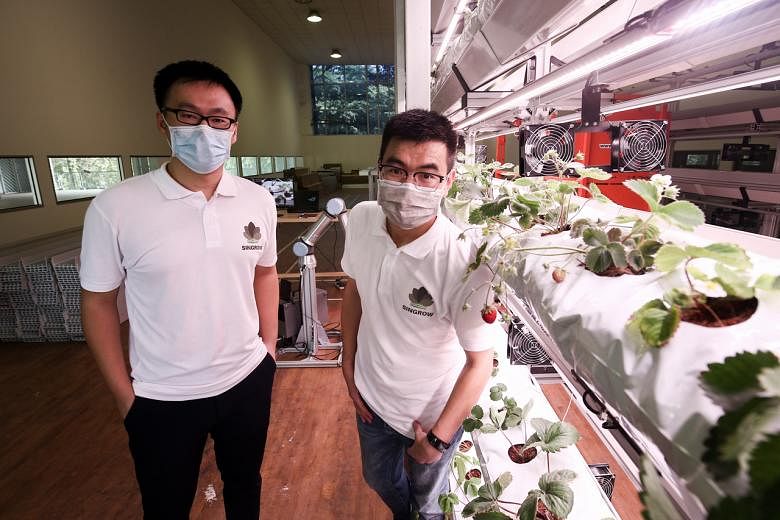SINGAPORE - More than $55 million has been set aside by Enterprise Singapore (ESG) to help local agriculture and aquaculture companies grow.
The grant will be used to boost their innovation capabilities, so they can work towards resource-efficient and high-yielding farming solutions.
Senior Minister of State for Trade and Industry Koh Poh Koon told reporters on Friday (June 26) that the $55 million grant complements Singapore's "30 by 30" goal - which is to cover 30 per cent of its nutritional needs by 2030 through local production.
"While there is a separate pot of funding for the 30 by 30 (target), the idea is to give added support to existing players in the market so that they can innovate and ramp up their capabilities quicker; in some ways, to provide better food resilience during the Covid-19 crisis and therefore make use of this crisis to hasten our 30 by 30 target," he said.
Dr Koh added that he sees the agri-food tech sector as an area of growth, bringing together "industry, enterprise and research and development". This will lead to"cross-pollination of ideas", potentially securing interesting jobs for Singaporeans.
Since the start of the year, investments of at least $40 million from both public and private sources have been made into agri-food tech start-ups.
Home-grown start-up Singrow is working closely with the ESG for its expansion plans. The company has benefited from the Startup SG Accelerator programme since receiving mentorship guidance on top of investment support last year.
The programme helped Singrow develop innovative cultivation methods for high-value crops such as strawberries.
Set in a repurposed sports hall with a 6.5m-tall ceiling, the company's indoor farm spans 500 sq m. It can produce up to eight tonnes of strawberries a year at full capacity - 20 times more compared with what a conventional strawberry farm of the same size can achieve.

Dr Bao Shengjie, co-founder and chief executive officer of Singrow, said that the controlled environment of the indoor farm - lighting, temperature, concentration of carbon dioxide and the acidity of the soil made of coconut peat - has helped reduce the time needed to cultivate the strawberries by around 30 per cent.
Artificial intelligence technology is currently used to pollinate and harvest the crops.
The seedlings, which were cultivated earlier this month, will yield a first harvest in September of around 200kg, or 1,200 punnets, of strawberries.
The time from seedling propagation to first harvest is estimated to be less than three months.
Once the workflow has been fully automated, the company will be able to ramp up its production to full scale, achieving a total of nine harvests a year.
Dr Bao added that Singrow plans to establish a larger facility for commercial crop production by early 2022, and has set its sights on expanding into overseas markets such as China, Indonesia, Malaysia and Vietnam.
It also aims to perfect its technology for licensing to other companies for the development of crops like leafy vegetables, which are in higher demand.


